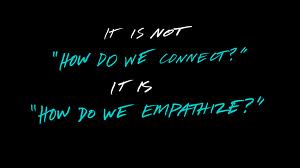Jan 13
1
Empathy in Business Relationships
Empathy in Business — Does it Belong?
I am reminded of the mafia rationalization: “It’s not personal; it’s business!”
However, I contend that business has always been personal, and is even more so in the age of consumer control.
According to Wikipedia, “Empathy has many different definitions. These definitions encompass a broad range, from caring for other people and having a desire to help them, to experiencing emotions that match another person’s emotions, to knowing what the other person is thinking or feeling, to blurring the line between self and other.”
The difference between empathy and sympathy is the difference between “I’m sorry” and “I apologize.”
Empathy in Business
Evidence of the relevance of empathy to business is outlined in the article on the Mind Tools blog called, “What’s Empathy Got to do with It?”
There are numerous studies that link empathy to business results. They include studies that correlate empathy with increased sales, with the performance of the best managers of product development teams and with enhanced performance in an increasingly diverse workforce. A few of these studies can be viewed on the site of The Consortium for Research on Emotional Intelligence in Organizations.
The fact that empathy is an important component of effective relationships has been proven: In studies by Dr Antonio Damasio (outlined in his book: “Descartes’ Error: Emotion, Reason, and the Human Brain.“), medical patients who had damage to part of the brain associated with empathy showed significant deficits in relationship skills, even though their reasoning and learning abilities remained intact.
Empathy is Natural
An article in Psychology Today entitled “Are We Entering the Age of Empathy?” , by Ray B. Williams, quotes research documented in a book, The Age of Empathy: Nature’s Lessons For A Kinder Society, by Dr. Frans de Waal.
The distinguished scientist says it is long overdue that we jettisoned our beliefs about human nature–proposed by economists and politicians–that human society is modeled on the perpetual struggle for survival that exists in nature. De Waal says this is mere projection on our part. Nature is replete with examples of cooperation and empathy.
Unfortunately, philosophy and religion as well as science have long suggested that caring and kindness do not come from our biological nature, but are ways that humans overcome biological instincts. In contrast, aggression, dominance and violence have been attributed to our DNA. According to de Waal, for humans and other advanced animals, sharing, compromise and justice matters. He argues that feeling and acting with empathy for others is as automatic as aggression.
The Golden Rule is Universal
The great Christian theological book, Mere Christianity, by C. S. Lewis, tells us that:
The Golden Rule of the New Testament (Do as you would be done by) is a summing up of what everyone, at bottom, had always known to be right. Really great moral teachers never do introduce new moralities: it is quacks and cranks who do that. As Dr. Johnson said, “People need to be reminded more often than they need to be instructed.”
Empathy Takes Effort
Seth Godin wrote (in Seth’s Blog):
When we extend our heart, our soul and our feelings to another, when we imagine what it must be like to be them, we expose ourselves to risk. The risk of feeling bruised, or of losing our ability to see the world from just one crisp and certain point of view.
It’s easier to walk on by, to compartmentalize and to isolate ourselves. Easier, but not worth it.


